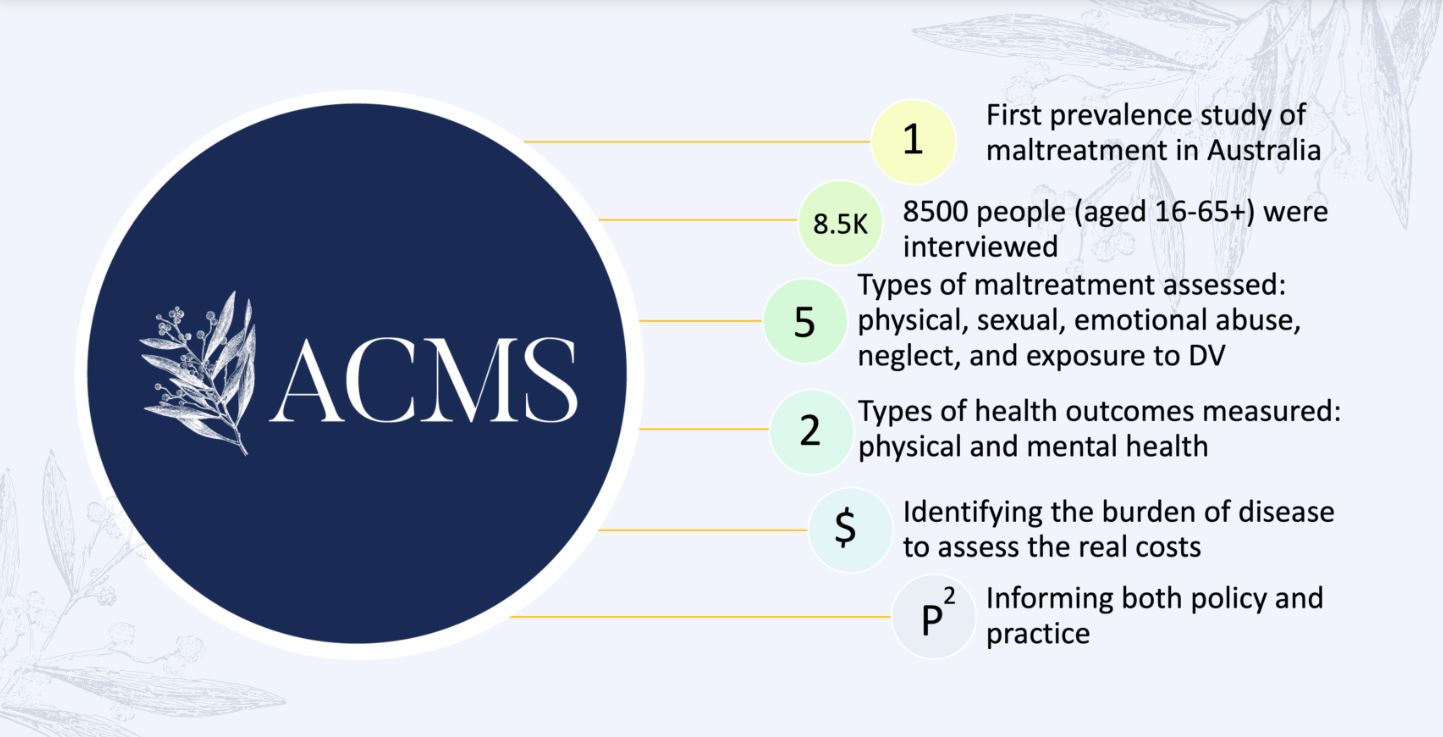Prof Daryl Higgins (Institute of Child Protection Studies, Australian Catholic University); Prof Ben Mathews (lead researcher, Queensland University of Technology); Prof Michael Dunne (Queensland University of Technology); Prof Rosana Pacella (Queensland University of Technology and University of Chichester); Prof David Finkelhor (University of New Hampshire); A/Prof Franziska Meinck (University of Oxford); Prof James Scott, A/Prof Holly Erskine, Dr Hannah Thomas (University of Queensland), Prof David Lawrence (University of Western Australia)
National Health and Medical Research Council
To learn about the prevalence, health and economic burden of child maltreatment
Reducing the prevalence of child maltreatment offers the greatest opportunity to prevent mental illness, suicide and other serious health problems in the Australian population. The Australian Child maltreatment Study (ACMS) is the first Australian prevalence study of child maltreatment. It looked at mental and physical health outcomes and surveyed 8,500 Australians aged 16 and over.
Led by a multidisciplinary team of international researchers, this comprehensive $2.3 million study of prevalence, health and economic burden of child maltreatment covered the five forms of maltreatment:

Source: Australian Child Maltreatment Study
Stakeholders from government, non-government and clinical sectors, including the National Office for Child Safety, were involved to maximise the potential of the study to produce relevant outcomes for government, not-for-profit organisations and clinicians.
Scientific findings have provided governments and policymakers with information on national public policy strategies about where, when and how to invest resources to reduce child maltreatment and respond effectively to it at an early stage.
The study also included national data about intimate partner victimisation including physical violence and multiple types of coercive control. Data collection began in April 2021 to find out for the first time how many Australians have experienced child abuse. Results have produced the first reliable evidence from a study of the national population about both exposure to domestic violence in childhood, as well as the experience of intimate partner violence as an adult.
Visit the Australian Child Maltreatment Study
Engagement with key stakeholders, including government departments and agencies involved in child protection, child and family welfare, child maltreatment prevention, mental health, and other health services continue to engage with the study findings and the team of researchers. A number of PhD students have been granted access to the data, under supervision of the Chief Investigator team. For example, at ACU, Gabrielle (Gabby) Hunt, Lottie Harris and Shayini (Dhatsayini) Rattambige have each included analyses of the ACMS as part of their doctoral studies. It is also being used by two Masters of Clinical Psychology students for their research thesis component.
Ongoing analysis is focusing on topics such as:
Infographic based on a paper published by Shayini Rattambige: The impact of child maltreatment patterns and adverse childhood experiences on problematic youth alcohol use. Click to download.
The impact of specific research findings on government policy and investment and how it's shaping service delivery responses can be difficult to measure. However, many organisations are referencing findings in their strategic plans.
References indicating impact
Anderson, C., & Jakob, L. (2024b). Australian Child Maltreatment Study shows a large proportion of Australians experience maltreatment as children. FACSIAR Summary.facs.nsw.gov.au
Jakob. L. & Anderson, C. (2024). Child maltreatment: Evidence-based insights for policy and program design, Evidence Brief, Family and Community Services Insights Analysis and Research (FACSIAR) NSW Department of Communities and Justice
Maidment, K., Grummitt, L., Birrell, L. & Carbone, S. (2024). Preventing child maltreatment to prevent mental ill-health. Prevention United: Melbourne.
For a summary of the approach to generating impact, see:
Higgins, D. J., & Mathews, B. (2024). Research engagement and impact: The Australian Child Maltreatment Study and pathways to evidence-based policy and practice. Children Australia, 46(1), 3012. https://childrenaustralia.org.au/journal/article/3012/
Impact on strategies on the ground
Government departments responsible for strategic investments have been in contact with the ACMS team to understand how cross-portfolio investments can be used to align with strategies to address the major implications. Here are some examples of take-up of the findings by government and non-government agencies in a range of ways:
November 2022, Tri-Peaks Partnership (2022). The Australian Child Maltreatment Study: Update on progress, and implications for policy and practice, Presented by Prof. Ben Matthews, Prof. Daryl Higgins (PowerPoint slides)
November 2022, Tri-Peaks Partnership (2022). The Australian Child Maltreatment Study: Update on progress, and implications for policy and practice, Presented by Prof. Ben Matthews, Prof. Daryl Higgins (Recording of presentation)
July 2022, Australian Institute of Family Studies (2022). The national prevalence of childhood corporal punishment and associated mental health outcomes, Presented by Prof. Daryl Higgins
July 2022, Australian Institute of Family Studies (2022). Australian Child Maltreatment Study: Associations between child maltreatment and mental health outcomes, Presented by Prof. Ben Matthews, Prof. James Scott, Prof. Daryl Higgins
Blake, J. A., Thomas, H. J., Mathews, B., Lawrence, D. M., Haslam, D. M., Higgins, D. J., Malacova, E., Erskine, H. E., & Scott. J. G. (2025). Childhood experiences of domestic violence and its association with mental disorders and health risk behaviours. The British Journal of Psychiatry. Published online 2025:1-8. doi:10.1192/bjp.2025.10362
Rattambige, D., Higgins, D. J., Whittle, S., Cole, M., Mathews, B., Scott, J. G., Erskine, H., Meinck, F., Pacella, R., Lawrence, D., & Haslam, D. M. (2025). The impact of child maltreatment patterns and adverse childhood experiences on problematic youth alcohol use. Child Maltreatment. https://doi.org/10.1177/10775595251387118
For a full list of publications that draw on ACMS data, go to the ACMS website.
See all media updates published by ACMS
We're available 9am–5pm AEDT,
Monday to Friday
If you’ve got a question, our AskACU team has you covered. You can search FAQs, text us, email, live chat, call – whatever works for you.